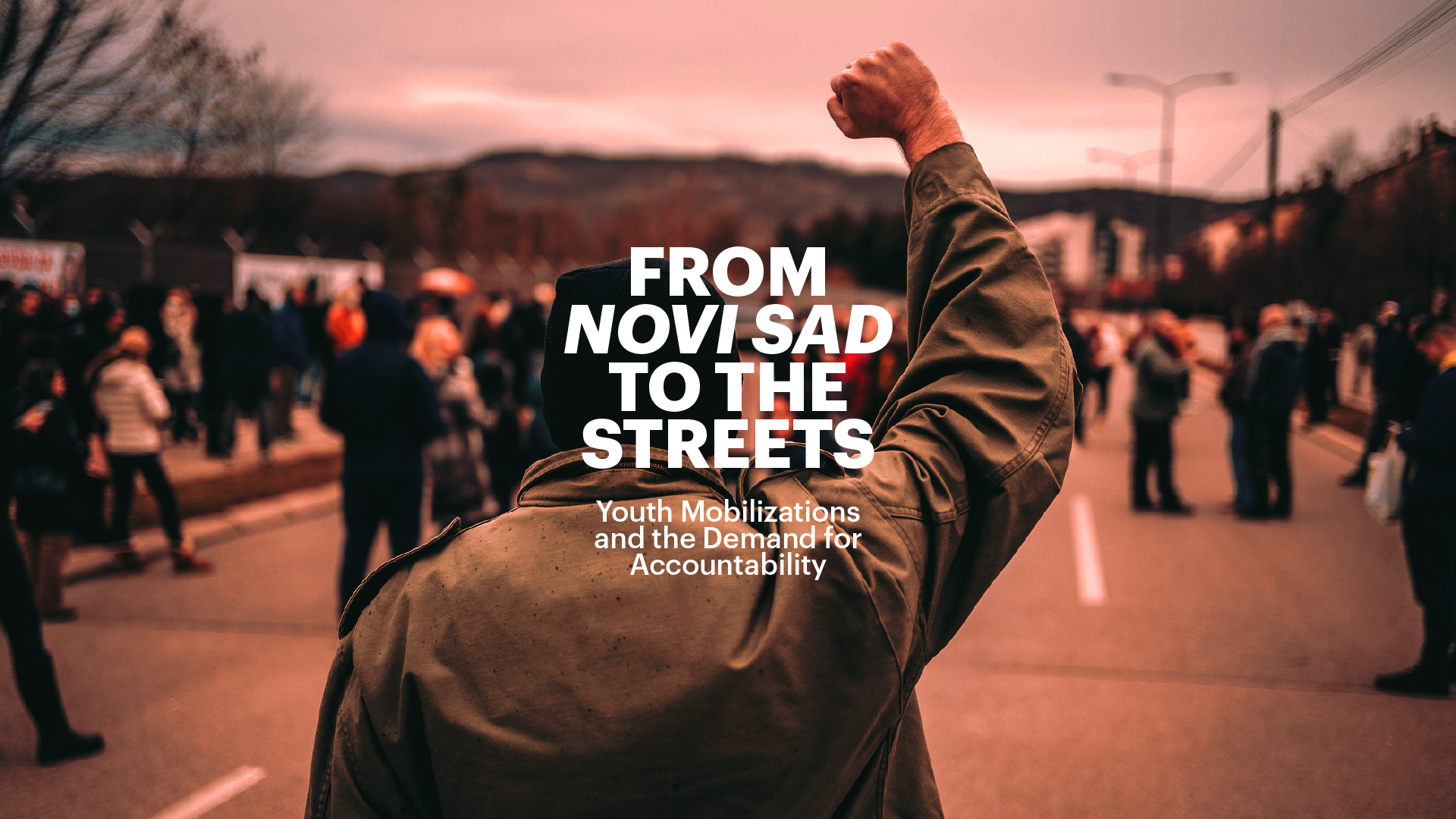
Velimir Milošev: Youth are not standing idly. We are demanding change and are not giving up on democracy
1. The duration of the protests in Belgrade, now over 2 months, and their mass participation is remarkable. What is the cause of the protests taking place in Belgrade? What is fueling the social unrest and mobilizations? And what are the main demands of the protesters?
It all started with the death of 15 people at the Novi Sad train station on November 1. The train station was reconstructed recently under dubious conditions. At the initial protests, many young people were wrongfully arrested and charged. We at the National Youth Council of Serbia responded by making an Overview of Youth Rights Violations and gaining support from youth organisations all across Europe to demand our gov’t to follow domestic and international law.
The protests gained increasing steam when students of the Faculty of Dramatic Arts in Belgrade were attacked on November 22 as they were conducting 15 minutes of silence in respect for the 15 victims. The brutality of this and the attacks that followed and the lack of response from institutions, especially the prosecutors, made students start blockading their Faculties all over Serbia, across five of our Universities. The constant images of peaceful protesters being run over and attacked, of young activists being spied on by the government, of foreign young nationals being harrassed by our secret services and thrown out of the country all caused the protests to grow and spread across Serbia. More about youth rights violations since the student blockades can be read in our updated Overview of Youth Rights Violations.
On December 22, a 100 000 protesters gathered in Belgrade to demand accountability and fulfilment of students’ demands. The momentum of the protests only intensified as other social groups joined the students in protest, including their professors, high schoolers, their teachers, farmers, lawyers and so on. On 24 January, a general strike was organised across Serbia, with a 24h blockade of the major highway in Belgrade on 27th January and a 24h blockade of a major bridge in Novi Sad on 1 February.
Ahead of Statehood Day in Serbia that is marked on 15th February, students from all over Serbia marched on foot and on horseback to the city of Kragujevac, a symbolic gesture harkening back to the First Serbian Uprising of 1804 commemorated on the same day.
When it comes to the students’ demands, they are simple and include:
- Publication of all documentation regarding the reconstruction of the train station in Novi Sad
- Dismissal of the charges against the arrested and detained students and young people at protests concerned with the train station incident
- Filing criminal charges against attackers of students and professors and ensuring their prosecution
- Increasing budget allocations in Serbia for material expenses of public higher education institutions by 20 percent
Despite numerous claims by the government of Serbia that the demands were met, students claim that they have not been and that they will continue blockading their faculties and protesting until they are. Prime Minister Vučević resigned on January 28 after an attack by Serbian Progressive Party activists in Novi Sad on students. Since then, there have been suggestions that elections will be held in coming months but both students and opposition parties are firm in their stance saying that elections are as of now unnecessary and that the focus is on students’ demands – on achieving basic rule of law.
2. We noticed that the protests are primarily directed against corruption? How is this related to the initial incident? Why is “corruption” chosen as a central element in the movement’s discourse?
The tragedy at the Novi Sad train station, with the canopy roof falling and causing the death of 15 people, looks to be a prime example of corruption. The train station, as mentioned, was reconstructed and its reconstruction was expedited up to meet unreasonable deadlines in time for elections – the train station was officially opened twice. The lack of published documents on the reconstruction highlights that the government and competent institutions were not doing their jobs ensuring the safety of the whole project.
This, alongside attacks on young activists and civil society and the lack of any accountability of public officials highlights to the public that competent institutions are not doing their job in investigating the tragedy and not doing their job in prosecuting attackers on activists. Judicial institutions are compromised, leading to the most clear examples of the lack of rule of law in Serbia. That is why the students’ demands are also aimed at institutions – they are asking them to do their job. The students are steadfast in their demands, and will not stop protesting or blockading their faculties until the demands are met and accountability is demonstrated.
3. What are the particular characteristics of these protests? How do they differ from previous ones? Are there any innovative elements? Do you notice anything different in terms of the forms of action or their frequency?
Students have historically led protests in times of great social crisis. The first ones were in 1968, the second one was in 1996-1997 in opposition to the Milošević regime and the ones we have now. Students have the ability to break through party politics and demand actual change in how the political system is organised – they are not standing for elections, they are not associating themselves with opposition parties and they are persistent in their demands. They are practising direct democracy, with decisions being made during plenary sessions at faculties where every single student can influence decision-making and can be involved in the implementation of these decisions. They are highly organised and communicate between faculties to organise the biggest protests Serbia has seen in modern history.
We have been hearing false accusations of youth being apathetic and uninterested in participating in society, in being involved in decision-making. This clearly highlights that the appetite for democracy is there and that official mechanisms have failed to account for youth and their opinions. They are highly distrustful of institutions and political actors and have thus taken matters into their own hands.
4. Do you feel a sense of initial justice with the political consequences being recorded in Serbia? Is the lack of political accountability one of the most important problems for the functioning of democracy today? Are mass protests ultimately the only way to hold a government accountable?
There is a clear backsliding of democracy everywhere in the world, and the lack of youth participation and real influence in decision-making alongside lack of real accountability for political leaders and public officials are driving this. According to the 2024 Alternative report on the position and needs of youth in Serbia that KOMS publishes shows that only 40% of youth believe that democracy is the right
way of governance. Youth have been warning for years that they don’t trust the system and don’t believe it is working for them. Unfortunately, the system has not responded to these signals, has not adapted. Instead, it has only further cracked down on rule of law and participation of youth.
Another example of this that has gone under the radar is the creation of a Law on housing loans for youth that was announced mid-December 2024, drafted during the holidays and passed to the National Assembly for adoption on January 17 without any youth giving opinion on it, not even seeing the draft law before it was voted on by the government.
During a session of the Advisory Council on Youth of the Government of Serbia that we at KOMS participated in on January 30, we were informed that not even our Ministry of Tourism of Youth was included in the drafting of the law! We left the session in protest, as we do not think that we can have dialogue without trust at this moment, and there is no trust because laws are selectively applied and democratic norms are being ignored.
With this state of affairs, it seems as though participation of youth via peaceful protests and other
unorthodox methods, alongside mobilisations of other social groups, may be the only way to hold the
government and competent institutions accountable and demand that law is followed.
5. The people of Greece and Serbia share a common sense of pain and outrage and express solidarity with each other due to these two tragic events. We know that Serbian protesters took part in the recent large-scale demonstration for Tempi in Greece, and that Greek students are participating in and supporting the protests in Belgrade. How significant is this expression of solidarity? What message can we draw from such actions?
I believe the youth of Serbia are incredibly grateful for the outpouring of support and solidarity we’ve seen across Europe in the past couple of months. Although I would guess that many do not know about the demonstrations in Greece, I have seen some Greek flags at protests across Serbia. I know that our students stand in solidarity with all those who are fighting for democracy across the world.
In the end, the message is clear – Youth are not standing idly by as corruption and lack of rule of law distorts our societies, we are demanding change and are not giving up on democracy. I believe the whole world can look up to the Balkans for inspiration to demand the same in societies world-wide.
*This interview was conducted on 7 February 2025 and updated on 17 February 2025.
Born in 1996, Velimir graduated in Political Science from the Faculty of European Legal and Political Studies in 2019, where he began engaging in youth activism through organizations in Novi Sad, dealing with youth work, gender equality and LGBT+ rights. He is a member of the Youth Council of the Government of Serbia, where he advocates youth rights on the national level.
Since November 2023, he has served on the Governing Board of the National Youth Council of Serbia (KOMS), becoming its President in September 2024. In this role, he represents Serbian youth at national, European, and international levels. Velimir is currently pursuing a Master’s degree in European Studies at the Faculty of Social Sciences, University of Ljubljana.



